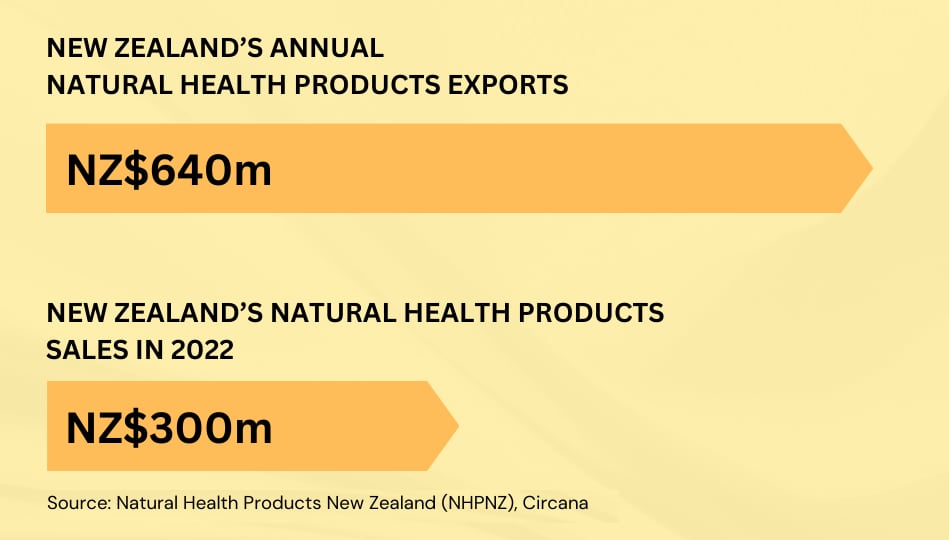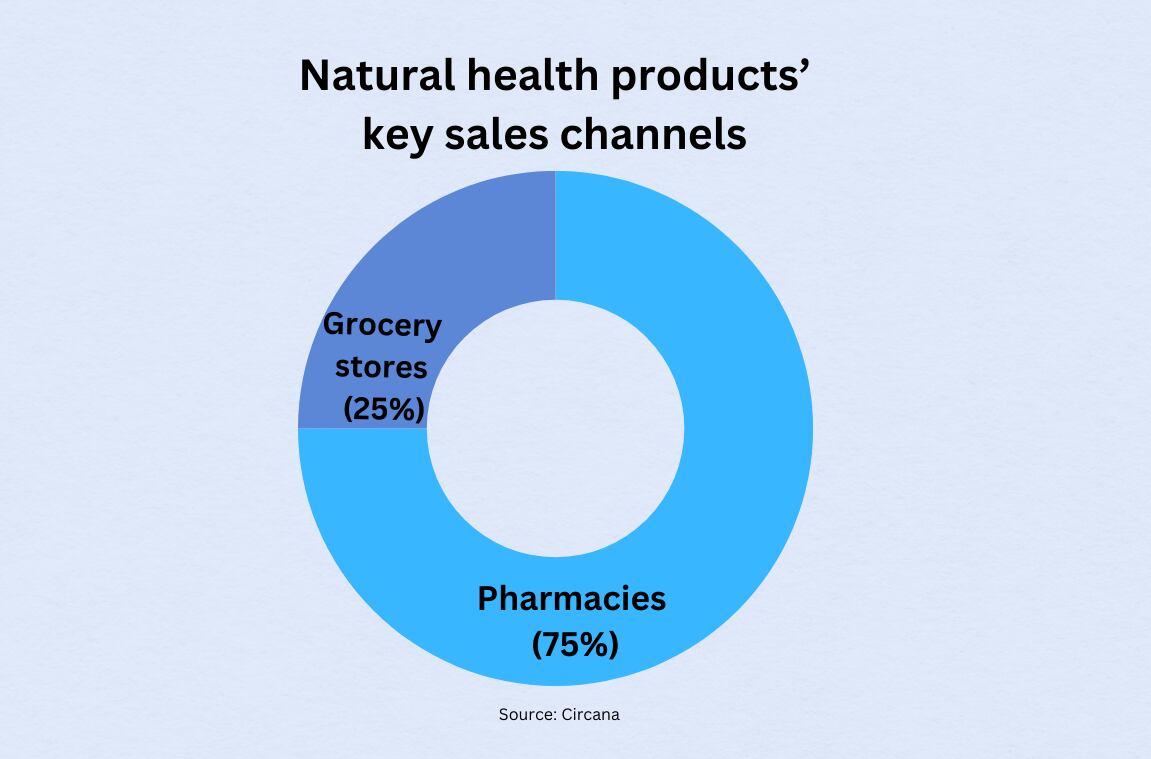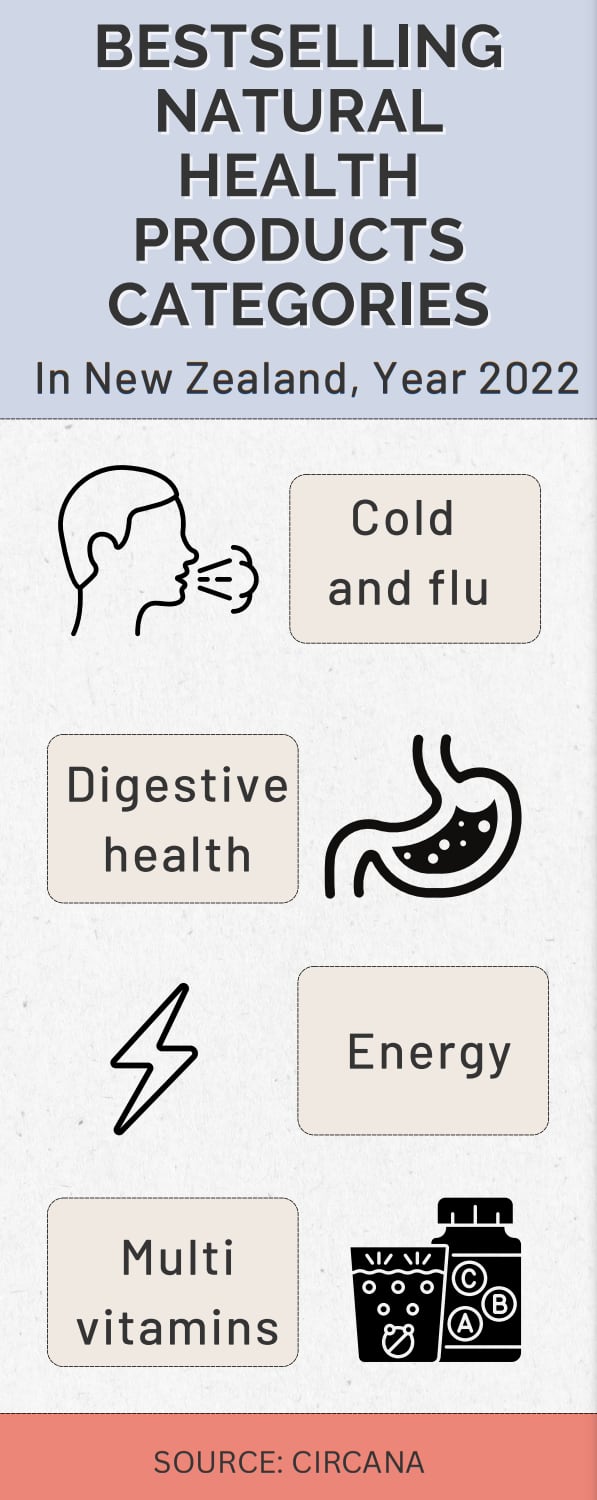With a population of only 5.12 million, New Zealand is focused on the export markets for net surplus of its local produce.
As a major dairy exporter, it exports about 320,000 tons of whey and other related dairy products, said a report published by New Zealand Trade and Enterprise this year.
Infant nutrition and sports nutrition are some of its key dairy products.
On the research front, there are government agencies such as Callaghan Innovation that provides funding and scientific expertise, in hopes of catalysing the commercialisation of science and support export growth.
In the last series of VitamINSIGHTS of year 2023, we will look into New Zealand’s natural health products and functional foods sectors, including the consumer behaviours, research efforts in local functional foods, and its regulatory regime.
State of the natural health products market
The natural health products industry alone exports NZ$640m (US$392m) worth of therapeutic products yearly, according to statistics from industry association Natural Health Products New Zealand (NHPNZ) – which counts over 80 per cent of all companies involved in the country’s natural products industry as its members.
New Zealand’s total natural health products sales last year were NZ$300m (US$185m), which was a 6.5 per cent increase in dollar value and a 1.5 per cent increase in units, according to market research firm Circana.

The purchase of cold and flu related products had topped the sales of natural health products last year, recording sales of NZ$60m (US$37m), which was up 7.7 per cent in dollar value year-on-year.
This was followed by digestive health, energy, and the multivitamin category.
Other product categories which made it into the top 10 bestselling list were those for cramps, women’s health, arthritis, nutritional oils, skin and sleep.
The bulk of the spending came from pharmacies at 75 per cent, while 25 per cent came from grocery stores, said Circana’s research consultant Julie Bramley earlier this year at the Natural Health Products Summit in Blenheim.
Growth opportunities in functional drinks, sports nutrition
Menopause, hydration, eye health, and food as medicines and gut health were highlighted as areas for growth in the natural health products sector, said Bramley.
In particular, she said that functional foods and fortified juices have witnessed high growth.
Local FMCG firm Red Shoots also pointed out that consumers were increasingly searching for products with functional benefits in supermarkets, especially after the pandemic.
The firm sells its Daily Good Immunity Shots across New Zealand’s Countdown supermarkets, Chemist Warehouse, HealthPost, and online. The shots are made with organic turmeric, ginger, manuka honey, blackcurrant, apple cider vinegar, and zinc.
On the other hand, the government agency New Zealand Trade and Enterprise (NZTE) believes that there is huge potential for the country’s pea protein sector to grow.
Four sectors are expected to drive pea protein’s growth, namely infant and toddler formulas, sports nutrition, premium pet food, and plant-based milk and meats.
Danone, for instance, launched a dairy and plant milk powder blend for infants and toddlers in New Zealand this year, making it one of the only two countries in which the product has been made available in Asia-Pacific. The other country selling the product is Australia.
The product contains 60 per cent dairy protein from whey and casein and 40 per cent non-GMO soy protein.
“There has been a big increase in parental desire to include more plant-based products in their children’s diet and we’re not seeing any signs of this trend slowing down.
“Although 100 per cent plant-based formulas are feasible to make, the risk is that they may result in nutritional compromises,” said Shantanu Das, head of innovation and PSQC at Danone Australia-New Zealand.

Market leader Vitaco also already introduced pea-protein based products into its Healtheries Slim whey-based range.
Musashi plant protein powder, said to promote muscle growth and repair, and Nuzest’s Kids Good Stuff multivitamin smoothie are some of the other examples of plant-based protein.
“Over the past decade, the New Zealand market has seen an explosion of both line extensions and new product launches into pea protein-based sports nutrition.
“As a result, New Zealand firms now make a huge range of pea-based sports nutrition protein powders across a wide range of brands.
“At the same time, New Zealand sports nutrition firms also make an innovative range of pea protein-based sports nutrition bars, cookies and similar,” said the NZTE report.
In fact, the domestic market accounts for 66 per cent of the country’s total sports nutrition products.
Pea protein-based sports nutrition products, for example, are mainly sold in supermarkets, accounting for 20 to 30 per cent of the purchase, followed by pharmacies (15 to 25 per cent), sports nutrition retailers (10 to 20 per cent), followed by health supplements retailers and online channels at five to 15 per cent each.
Unichem pharmacy, Health 2000 supplements retailer, and Four Square supermarkets are some of the key retailers selling pea protein products.
On average, consumers pay an estimated price of NZ$7.23 (US$4.62) for pea protein products.
The market demand for pea protein has the potential to grow by 10 times over the next decade – from 530 tons to 5,500 tons, the report added.

Research on local products
From Pamu deer milk to the feijoa fruit and Mānuka honey, various local products are studied for their potential health benefits.
The Feijoa fruit, for example, is being used in a six-month study designed to explore its benefits for weight loss and lowering blood sugar.
Named FERDINAND, the study, involving 160 prediabetic and obese or overweight participants, is funded by New Zealand’s High Value Nutrition National Science Challenge as part of the Challenge’s larger Metabolic Health Priority Research Program.
The program works with local food and beverage firms to tackle weight gain and the development of type II diabetes in Asian communities.
“Asia is a huge market for New Zealand foods and beverages. So, being able to make a health claim about a particular food means a lot to these companies. We’re trying to build the science for these companies,” said principal investigator Associate Professor Jennifer Miles-Chan.
New Zealand-headquarter Mānuka honey manufacturer Comvita is also on a mission in building the scientific evidence behind its products.
One of its latest discoveries is the compound LepteridineTM as a component unique to Mānuka honey.
The compound comes in the pteridine structure, which is known to exhibit multiple biological activities.
A clinical trial has been designed to investigate the potential of Comvita's Lepteridine™ Standardised Mānuka Honey in improving gastrointestinal symptoms and quality of life in people with digestive discomfort; and its impact on inflammatory biomarkers, immune cell function, and the gut microbiome.
This is a study supported by the High Value Nutrition National Science Challenge, with University of Otago leading the study.
Comvita believes that building the scientific evidence behind its products is crucial in earning consumer trust, chief science officer Dr Jackie Evans told us.
“New Zealand is a relatively small market for Comvita, but it is definitely a growing market with plenty of opportunities."
Amongst local New Zealanders and Asian diaspora residing in the country, the company notices that the latter inherently recognises the health benefits of Mānuka honey, which is less so in the former.
“From our perspective, the New Zealand market can be split into two categories – one is the domestic market which comprises of New Zealanders and the other comprises of the large portion of Asian people who have migrated to New Zealand recently, either to settle permanently or as students, or are visiting as tourists.
“Probably the biggest difference between the two groups is that Asian consumers inherently recognise the medicinal benefits of Mānuka honey and see it as a premium health product with science behind it. They have grown up thinking of honey as part of traditional Chinese medicine used for millennia to treat various ailments, including digestive health.
“The domestic market comprises more consumers who still see honey as a sweet food and something to spread on toast, because a lot of New Zealanders would have grown up at a time when the health benefits of Mānuka honey were not well known," Dr Evans said.
She explained that this was because it was only about 30 to 40 years ago that the health benefits of Mānuka honey were starting to be truly understood.
“This is because it wasn’t until the late 1980s and early 1990s that the health benefits of Mānuka honey were starting to be truly understood. And that focus on scientific understanding and evidencing the benefits of our products through high quality science is at the heart of what we do at Comvita, so that all consumers, including both Asian and Western consumers, can trust that our products work,” she said.
In addition, it is challenging for the New Zealand consumer market in identifying high quality and authentic Mānuka honey.
Dr Evans said this was because the Export Quality Standards mandated by the Ministry for Primary Industries (MPI) did not apply to the domestic market.
"This creates a situation in the domestic New Zealand market that sees some brands selling low quality bush honey labelled as Mānuka. We don't think this is right and are strong advocates for higher quality standards across both domestic and export markets," she said.
She emphasised that Comvita has been selling only Export Quality monofloral Mānuka honey in New Zealand, with an in-house International Accreditation New Zealand (IANZ) accredited and MPI recognised honey testing laboratory.
Regulatory uncertainties
New Zealand’s natural health products sector has been expecting a new set of regulatory system known as the Therapeutic Products Act 2023, but this is now about to go up in smoke, as the new coalition government formed on November 24 has said that it would repeal the Act.
This means that the sector would need to stick with regulations dating back to the 1980s, which have been criticised over the years for being outdated and does not allow natural health products to make therapeutic claims.
Dietary supplements, such as vitamins and mineral tablets, are also not allowed to state or imply therapeutic purposes under the existing Dietary Supplements Regulations 1985.
The Therapeutic Products Act 2023 had received the Royal Assent on July 26 this year and was expected to come into force from September 1, 2026.
Repealing the Act would be a “huge blow” to the industry, especially products for exporting overseas, said industry association NHPNZ.
“We are very disappointed at this agreement which flies in the face of the significant contribution the industry makes to our economy through exports and jobs,” said Samantha Gray, NHPNZ’s government affairs director.
“The industry exports $640 million of therapeutic products every year and employs thousands of New Zealanders but we are once again being left high and dry by this decision which we are struggling to understand.
“We waited so long for the Therapeutic Products Act to be finally passed this year and while it’s far from perfect, it provided a long-awaited regulatory framework to allow the industry to take a big step forward.”
With the “right suite” of regulations, Gray said that the member companies believed that exports could go up by double.
“We urgently need a regime that encourages innovation and export and reassures consumers about safety and quality. This should fit squarely in the new Government’s economic growth agenda. We call on the new Ministers of Health, Trade and Innovation to meet with us urgently on this matter,” she added.





